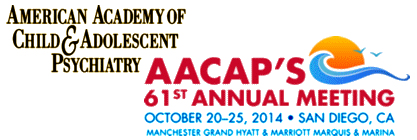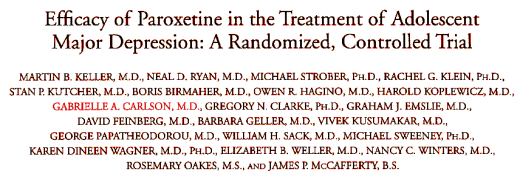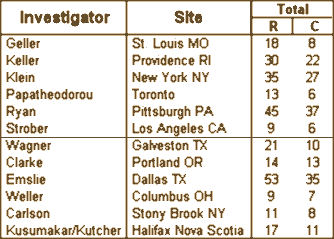
"We look forward to welcoming you to sunny San Diego for AACAP’s 61st Annual Meeting!
Gabrielle Carlson, MD, AACAP’s Program Chair, welcomes you to San Diego from the USS Midway, the site of the Welcome Reception on Wednesday, October 22. All are invited to attend!"
In the spirited video from the deck of the USS Midway, Gabrielle Carlson sporting a sailor’s cap, welcomes us to the AACAP Annual Meeting, ending with the words, "Get here however you can!" You may not recognize her name right off. Here’s a reminder:

The Dramatic Rise in Neuroleptic Use In Children:
Why Do We Do It and What Does It Buy Us?
Theories from Inpatient Data 1988-2010by Gabrielle A. Carlson, MDJOURNAL OF CHILD AND ADOLESCENT PSYCHOPHARMACOLOGY 2013 23[3]:144-147.…It is ironic that the most noxious and impairing behavior, namely explosive outbursts in children, has no ‘‘home’’ in the DSM no- sology. Recognizing that explosions can occur in many conditions, neither intermittent explosive disorder nor, if it is accepted into DSM-V, DMDD, allows the diagnosis if the explosions are ‘‘better explained by’’ another condition. There is not even a consistent way in which one can find information about rage outbursts. In PubMed, there are almost completely different databases for terms like rages, rage outbursts, anger outbursts, rage attacks, explosive outbursts, and meltdowns. Irritability, the term that seems increasingly to be adopted, like aggression, may sub- sume these behaviors, but is not synonymous. Therefore, we speculate that the behavior that most drives the most use of AAPs does not even have a label that can be consistently used, and will certainly, without a "home," never be an indication for FDA approval….
In conclusion, the meteoric rise in the use of AAPs in children with ADHD and ODD reflects the fact that the traditional evidence-based treatments (stimulants and parent training/behavior modification) are either unsupported by providers and insurance (at least in terms of the intensity they require) or that these treatments are insufficient, because of the severity of the conditions being treated.
AAPs may be expensive, and clearly have important adverse effects. The question is whether society (and insurance companies) want to support the alternatives. If they do not, I feel that the rhetoric is disingenuous. I, for one, would be grateful if the AAPs could compensate for what we have lost in terms of other treatments, and were as powerful as the media imply.
However, I not only think that haunting these authors is justified, but is actually an imperative. Twenty of the twenty-two authors of Study 329 are still alive, six are in significant leadership positions in the American Academy of Child and Adolescent Psychiatry, and others dot the by-lines of other ghost-written industry-funded experimercials like this one. Gabrielle Carlson is AACAP’s Program Chair welcoming the attendees to the meeting. It is likely that many of the named authors were on the by-line of that article only because they were site primary investigators for the clinical trial itself and little involved in the writing or the extensive data manipulation involved in creating this masterpiece of deceit – now a monument to an era yet to be fully acknowledged.
 In the case of Dr. Carlson, Stony Brook was in the group of sites added to Paxil Study 329 late because of slow recruitment and accounted for only 11 subjects in the trial. She’s not mentioned in any of the subpoenaed documents that I know of. Apparently it was simply a source of revenue for Stony Book, and another paper to add to her CV. But that’s the whole point. Other than the two SKB/GSK employees who directed the show creating the paper with ghost-writer Sally Laden, the actual non-involvement was true for the twenty academic authors whose names were on that author‘s list. They lent their academic credentials and the reputations of their institutions to the paper, a ticket insuring that it would be accepted in a prestigious journal and read by colleagues who respected those honorifics, without really participating in its creation. But even worse, in the decade during which the paper has been universally vilified, not one of those authors has come forward and said a word. They continue to occupy high places, adding an obvious irony to Carlson’s comment, "Get here however you can!"
In the case of Dr. Carlson, Stony Brook was in the group of sites added to Paxil Study 329 late because of slow recruitment and accounted for only 11 subjects in the trial. She’s not mentioned in any of the subpoenaed documents that I know of. Apparently it was simply a source of revenue for Stony Book, and another paper to add to her CV. But that’s the whole point. Other than the two SKB/GSK employees who directed the show creating the paper with ghost-writer Sally Laden, the actual non-involvement was true for the twenty academic authors whose names were on that author‘s list. They lent their academic credentials and the reputations of their institutions to the paper, a ticket insuring that it would be accepted in a prestigious journal and read by colleagues who respected those honorifics, without really participating in its creation. But even worse, in the decade during which the paper has been universally vilified, not one of those authors has come forward and said a word. They continue to occupy high places, adding an obvious irony to Carlson’s comment, "Get here however you can!"
Sure, Managed Care bureaucrats have pushed atypical antipsychotics over more intensive and expensive interventions [keeping the cost of medical care down]. Of course the Pharmaceutical Industry has promoted antidepressant medications for treatment of adolescent depression [in the business of selling FDA approved drugs]. Yes the professional organizations have created guidelines that recommend these practices [evidence-based medicine from peer-reviewed journals]. But without those names on the by-line certifying the articles, the papers wouldn’t have been published that allowed those things to happen. And when the authors sit in silence in their own careers even after it becomes clear, as in this case, that they lent their names, positions, and institutions to a fictional publication, they are the main force in the center of perpetuating what’s wrong.
If there’s not been one peep from AACAP about a former president of the organization being convicted of a serious felony, then how can we ever expect those within the organization to acknowledge something like Paxil Study 329? Just asking; I’m not sure what would have to happen for those sorts of group dynamics to change…
William Ayres was President of AACAP twenty years ago [link] and convicted last year as a serial child molester [link].
The “explosion” could be R.A.D., or any number of attachment issues. A rash of child explosions sounds a bit off key.
Dr. Carlson and her handlers at AACAP get an A for vapid tackiness… is this any way for a serious professional society to present itself?
We aren’t even counting the number of children and adolescents disabled a killed by this “academic” hubris. There is NO WAY TO DO REALISTIC RISK /benefit analyses for using “psychopharmacology”. Standards of care in psychiatry are serve primarily as an affirmative defense for medical fraud and medical malpractice.
We aren’t even counting the number of children and adolescents disabled and killed by this “academic” hubris. There is NO WAY TO DO REALISTIC RISK /benefit analyses for using “psychopharmacology”. Standards of care in psychiatry are serve primarily as an affirmative defense for medical fraud and medical malpractice.
What about her persistent focus that the answer is in creating label so what we have “an indication for FDA approval”?
So who’s going to this meeting?
Speaking of 329’s authors. In August 2012, Dr. Koplewicz had an advice column for new psychiatry residents. And in the same issue Dr. Wagner had a review article on the use of antidepressants for children. Her summary: “These 2 articles by Gibbons and colleagues provide reassurance about efficacy and safety of fluoxetine for treating depression in children and adolescents. Although there was no significant effect of treatment on suicidal thoughts and behavior in youths, fluoxetine did not increase suicide risk in this population.”
How many kids have died from Fluoxetine?
And, Paroxetine?
I am an adult and I know exactly how these SSRI’s cause extreme psychosis, but how a little child could possibly cope is the most extreme form of pharmaceutical battering than we can all possibly take in.
Children do not wake up one day and hang themselves.
Children are not capable of making suicide, they would rather bake apple tarts.
Children need our protection from ruthless enterprises and it is our job to ensure that there is not one more childish suicide from Fluoxetine, Paroxetine, or, any other safe drug.
“Children do not wake up one day and hang themselves.
Children are not capable of making suicide, they would rather bake apple tarts.”
We’d like to think this is true, but it isn’t. Children and adolescents committed suicide before 1950 and the advent of antidepressants.